|| An Israeli folklore ||
Once upon a time there lived a lazy king. His kingdom was on the edge of the world, according to the knowledge of those times, and almost entirely surrounded by the sea. Nobody seemed to care what lay beyond the barrier of rocks that shut off the land from the rest of the world. In fact, nobody appeared to trouble much about anything in that kingdom.
Most of the people followed the example of the king and led idle, careless lives, giving no thought to the future. The king regarded the task of governing his subjects as a big nuisance. “Don’t bother me,” was his usual remark. “You are my advisors and officers of state. Do your best.” And off he would go to his beloved hunting which was his favorite pastime.
The land was fertile, and nobody had ever imagined that bad weather might some year affect the crops and cause a scarcity of grain.
One summer there was a great lack of rain and the fields were parched, the winter that followed was marked by suffering. The kingdom faced severe famine.
People appealed to the king but he could not understand the difficulty. He passed it off very lightly. “I am a mighty hunter,” he said. “I can always kill enough beasts to provide for all”
But the drought had greatly reduced the number of animals. The king found the forests empty of deer and birds. Still he failed to realize the gravity of the situation and what he considered an intelligent idea struck him.
“I will explore the unknown territory beyond the barrier of rocky hills,” he said. “Surely there will I find a land plenty of crops and animals. And, at least” he added, “it will be a pleasant adventure with good hunting.”
A great expedition was therefore arranged, and the king and his hunting companions set forth on the sea. After searching for 3 days, they found a small passage through the rock barrier and for the first time, all of them saw the land afar.
It seemed a vast and beautiful land. Carefully, the hunters descended the other side of the rock barrier and entered the unknown land.
It seemed uninhabited. No sign of beast or bird, certainly not a man. As far as the hunters could make out, no foot had ever trodden the region before. Even nature seemed at rest. The trees were all old, their leaves yellow as if growth had stopped ages ago.
The silence was rather eerie, but the novelty made it pleasant to the king, and he kept on his way for four days.
Then the forest ended abruptly, and the explorers came to a vast open plain, a desert, through which a wide river flowed. Far beyond rose a mountain capped with what seemed to be a castle in ruins.
“Water,” said the vizier, “is a sign of life.” So the king then decided to ascend to the top of the mountain.
The next day, a distinct path to the top of the mountain was discovered. It was covered with moss and thick overgrowth. The trail was accordingly difficult, but half way up, they all noticed the first sign of life since the expedition began.
It was an eagle. Suddenly it flew down from the mountain top and circled above the hunters, screaming, but making no attempt to attack. They looked up and saw that the screeches had woken many eagles who were circling high up in the sky.
The party reached the top. The castle was an stupendous one, with massive walls and impressive towers. It must have been a grand palace once! But they could find no way to enter.
The entire next day was spent searching for a door, window or opening, but no avail. It was puzzling. Finally one of the men found an eagle’s nest on one of the smallest towers and he secured the bird with great difficulty.
Muflog, one of the wise men, who could speak the language of the birds, asked the eagle for directions. The eagle replied, “I am but a young bird, only seven centuries old. I know naught. Ask my father who dwells on a higher tower”
So the men climbed higher and asked the father eagle. The father eagle told Muflog to ask his grandfather, who resides on the topmost tower and is two thousand years old.
The grandpa eagle seemed asleep and was only awakened after much coaxing. Then he surveyed the hunters warily.
He muttered slowly, “I did hear, when I was a tiny eagle chick, a king lived in this palace; that he died and left it to the eagles; and that in the course of many, many, many thousands of years the door had been covered up by the dust brought by the winds.”
“Where is the door?” asked Muflog.
“The first rays of the sun fall on the door”, croaked the eagle and promptly dozed off again.Everyone sat waiting eagerly.
The next dawn, the place where the first rays of the sun fell was noted and digging began. After many hours, an opening was found. They were finally in!
What a wonderful and mysterious place it was, all overgrown with the weeds of centuries! The men hacked through the wilderness with their swords at last they came to a door on which was an inscription cut deep into the wood. The language was unknown to all but Muflog, who deciphered it as follows:
“We, the Dwellers in this Palace, lived for many years in comfort and luxury. Then hunger came. We had made no preparation. We had amassed jewels in abundance but not corn. We ground pearls and rubies to fine flour, but could make no bread out of it. Wherefore we die, bequeathing this Palace to the eagles who will devour our bodies and build their eyries on our towers.”
A dreadful silence fell when Muflog read these strange words, and the king turned pale. This warning from the dead from the past was making the adventure far from enjoyable.
Beyond the door with the inscription, they found an airtight chamber having life-size statues of the kings and their vast wealth: gold and many precious stones. The king walked to the edge of the tower and looked at the vast desert upto the horizon. In his imagination he saw the magnificence of the palace and the land that was once fertile and prosperous.
All in ruins, turned to dust and mould.
The party went home without taking anything. The king addressed his subjects, “Ye shall not starve, I have brought wisdom from the Palace of the Eagles. From the fate and sufferings of others, I have learned a lesson—my duty.”
At once he set to work to organize the proper distribution of the food supply and the cultivation of the land. He wasted no more time on foolish pleasures, and in due course the land enjoyed happiness and prosperity and even expanded to fruitful settlements in the plains overlooked by the Palace of the Eagles.
Like (0)

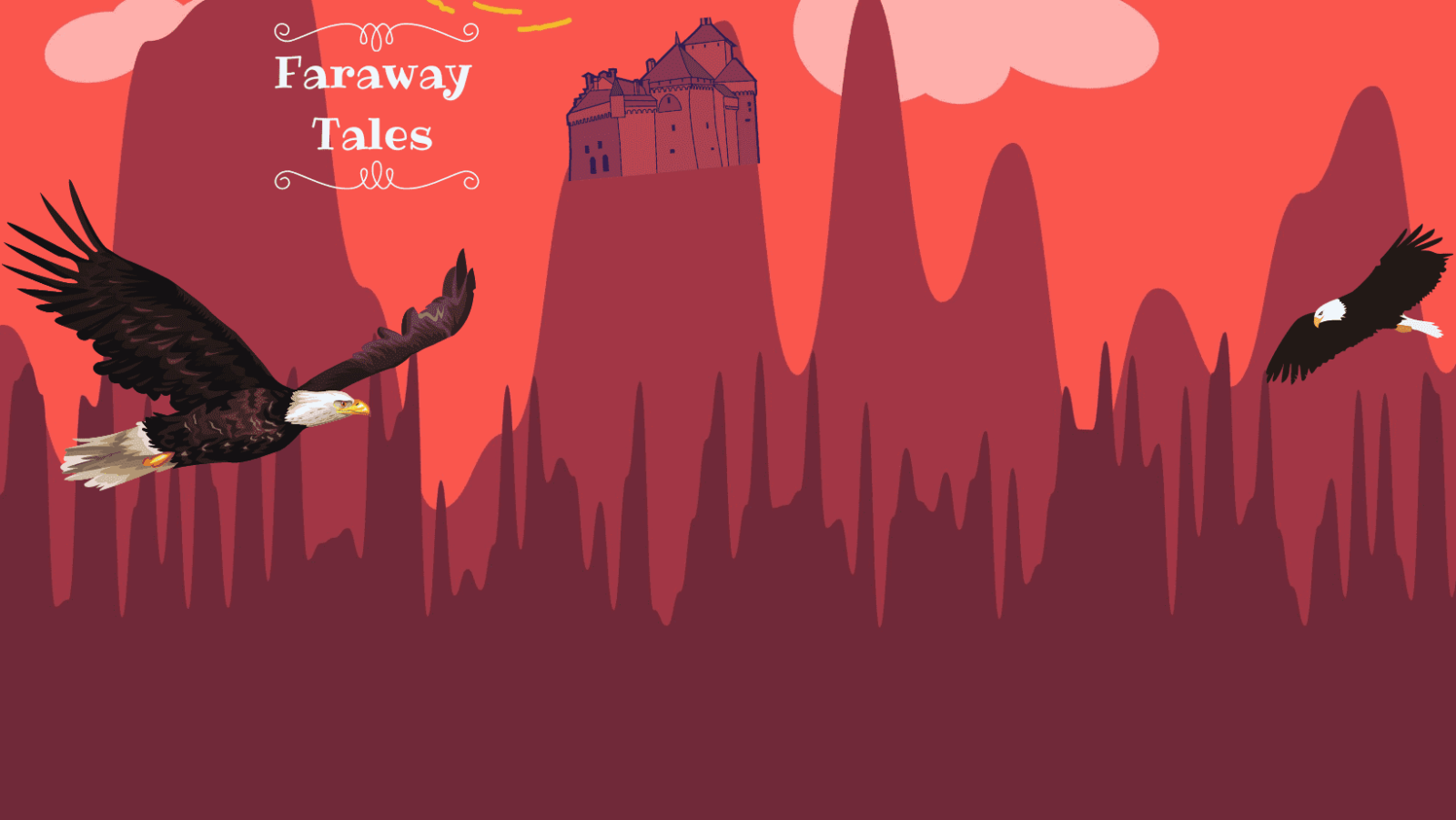
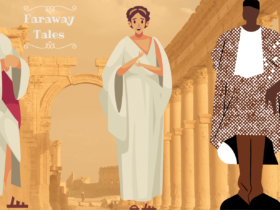
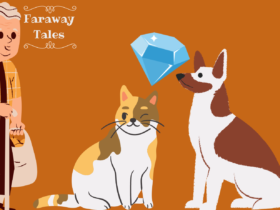
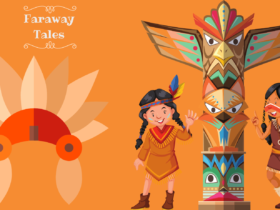
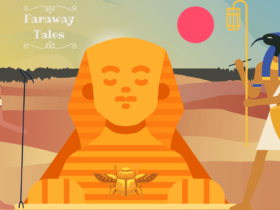
Leave a Reply